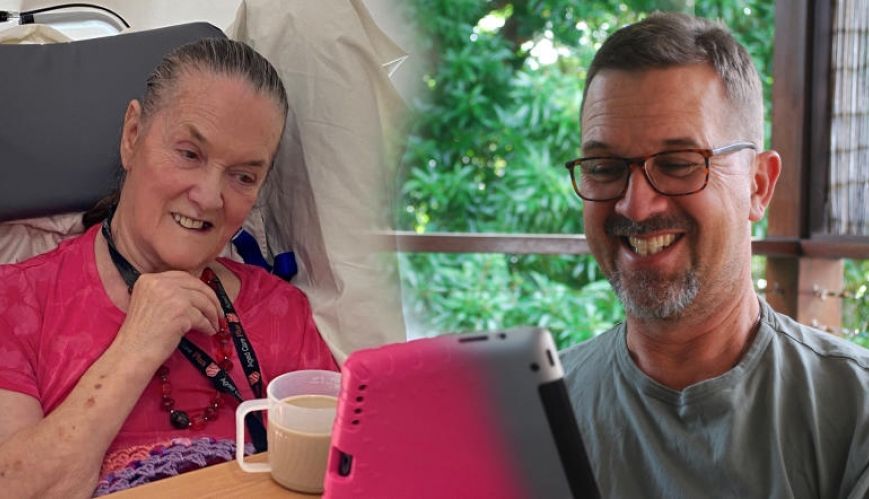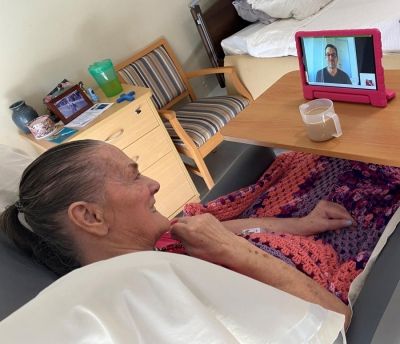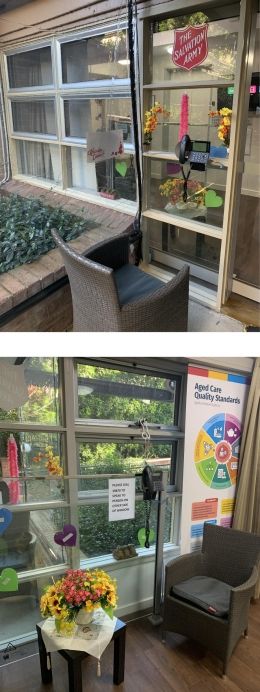Technology brings isolated loved ones 'together'

Technology brings isolated loved ones 'together'
Robin Tittel gets to speak with her son, Raoul, using the Army’s aged care tablet technology.
The outbreak of the COVID-19 virus has thrust The Salvation Army into a technology space unprecedented in the church’s history.
While audiovisual and technical teams at corps, mission and centres scrambled to find suitable platforms to host their online work and programs to help produce them, it’s the people trying to get access to them that faced the biggest challenge.
Forget about the current generation, Generation Z. They were born tech-savvy, having been born during the J-curve of digital growth. Generation Y – the millennials – are doing okay and so, too, the Generation X-ers (Baby Boomers) or if they’re having any difficulty they are keen for the challenge because they understand technology a little better having given birth to the generations that use it predominantly.
What about the silent generation? The people born from the mid-to-late 1920s until the early-to-mid 1940s – those over 70 – how are they coping? They still go into the telco shops and ask for a telephone that “just makes phone calls”. No SMS or photography in their thinking.
To expect that generation to sit in front of their computer and know how to switch the camera on or to ensure the internal microphone works is asking a bit much – especially when the grandkids can’t come over because of the social-distancing and isolation requirements at the moment.
How do they get help with Zoom and Facebook Messenger, Teams and Whatsapp and the myriad of other excellent video chat platforms out there – free or otherwise?
The Salvation Army Aged Care was quick to react to the needs of its 1700 residents across the country that fit into that category and came up with a “technology solution” to connect them with their families during the COVID-19 pandemic as they were unable to have visitors.
The Salvation Army National Director, Aged Care, Richard de Haast, said it was important to provide a platform for residents to have some type of face-to-face interaction with their loved ones if only for their overall mental and emotional health.
Just over a month ago, Richard began hosting online question-and-answer meetings with residents in Salvation Army aged care facilities to hear any comments or feedback “that are occupying their minds” in respect to COVID-19 and to pass on any developments.
As a result of those Q&A sessions, Richard called on the Army’s IT department to come up with a “technology solution”, which saw the successful introduction of scheduled, one-on-one video sessions so residents could connect with their loved ones.
This involved moving from the Zoom platform (which was used for the Q&As) to VSee, which is less data-hungry. The software was loaded onto a number of dedicated android tablets. Richard said VSee provided “an added layer of security” and required a complete set of instructions to be sent to the 20 centres across the country to staff, residents and their families.
He said the new software had a scheduling component that allowed staff to know when a call was scheduled, which would allow the centre to ensure a staff member was on hand to help with any technical issues should they arise.
Some centres set up the tablets in a dedicated lounge space and the resident go there when their call is scheduled. The tablet is taken to residents’ rooms if they are confined to their rooms or just want more privacy.
“We knew at some point centres may need to stop having visitors so I contacted (the head of IT) and said: “We’re moving in this direction. I’d like a technology solution that allows video calling for multiple people but has a scheduling function that allows us to make sure we have a staff member available to support the resident so he put his team to it and they came back with a solution,” Richard said.
 Robin Tittel speaks to her son via VSee video link from the Bethany facility.
Robin Tittel speaks to her son via VSee video link from the Bethany facility.
Video link
Raoul Tittel, from said he was truly grateful that the Army had introduced the technology to the facility where his 80-year-old mother, Robin Tittel lives – Bethany Aged Care Centre in Port Macquarie on the NSW Central Coast.
He said that he had been unwell recently and unable to visit his mum as regularly as he did – once or twice a week – so being able to use VSee was wonderful. Raoul, who lives within 1km of Bethany, said Robin was not “tech shy” but had trouble initially getting used to any new technology.
When Raoul made his first video call to his mother, he said the Bethany staff took the tablet to her room, as she is largely bedridden, and sat the device on a table in front of her as she sat in a chair. Robin described it as “amazing” to be able to speak with her son and see him at the same time. “I felt very lucky,” she said.
“When she initially saw me, it took a little bit of getting used to I think but, the more we spoke, the better it got. It’s actually easier than using the phone,” Raoul said. “She has difficulty holding the phone in the right position so often my phone calls to her become quite frustrating for both of us I think. I can see why the restrictions are so tight on seeing them socially. This technology is better than the phone. It’s just really nice that we had this opportunity.”
Robin has lived at Bethany for about four years after having moved from Penrith in Sydney when ill health prevented her living at home. Raoul, a draftsman, works in Newcastle, south of Port Macquarie, but has been working from home amid the COVID-19 restrictions
Nick Bannon, Bethany’s centre manager, said that all that was needed now was the technology that could give Robin a Raoul hug!
 The WindowsConnect area at Maybanke aged care facility.
The WindowsConnect area at Maybanke aged care facility.
Window of opportunity
Another initiative the Army has introduced at its aged care facilities is called WindowConnect.
Sophia Yang, the new manager at the Army’s heritage-listed Maybanke Aged Care Centre at Dulwich Hill in inner-western Sydney, said WindowConnect enabled residents to see each other through a window.
Sophia, who only took on her new position at Maybanke this month, said the visitors were set up in an area protected from the weather outside the facility and were connected by a telephone to the relative they could see through the window.
She said that as restrictions on visitors had been eased in NSW from Level 5 to 4, families could not visit, but residents considered still at risk of contracting the virus and family members who had not had the ‘flu vaccine were still required to use the WindowsConnect system.
At Maybanke, Sophia said the WindowConnect area had been decorated to give a more friendly atmosphere rather than just having the building’s window between them and their loved ones.